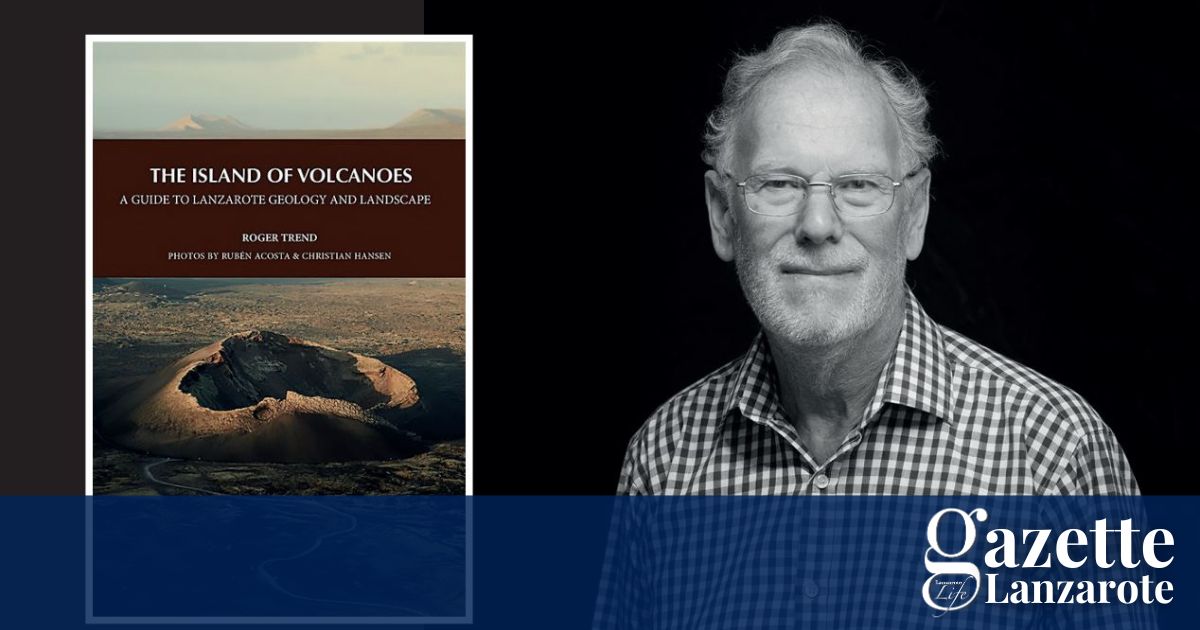Earlier this year, geology expert Roger Trend released his book Lanzarote: Island of Volcanoes. It’s a hugely informative guide to the powerful forces that created and shaped the island, and we decided to meet Roger to find out more.
How well do you know Lanzarote, Roger?
I’ve been coming here with my wife Sandra for around 25 years. We used to visit other islands, but nowadays we only come here, really – Lanzarote is just so special. Since retirement we visit more often and have probably been here 100 times.
What urged you to write the book?
I have a PhD in Geology Education and spent 20 years in British universities lecturing in Earth Science education. Lanzarote is obviously fascinating from a geologist’s point of view, and I was inspired to start giving talks at the Natura Palace hotel in Playa Blanca.
I soon realised there was no popular book on the subject available for locals or tourists and decided that I would write one. I was lucky to receive full support from Ediciones Remotas, who have also helped me contact valuable sources here on the island – my Spanish isn’t very good, unfortunately.
What kind of sources?
I’ve been in touch with Lanzarote’s Geoparque, caving associations, Professor Juan Carlos Carracedo, who is one of the world authorities on Canarian geology, and many others.
Is there a place you’d recommend that sums up the wonders of Lanzarote’s geology?
The Volcán del Cuervo is open to the public and offers an amazing glimpse at what happened in the 1730 eruptions. It’s also close to the Montaña Colorada, too, so you can tie that visit in as well.
Which other landscapes are you fascinated by?
The Peñas de Tao, on the road from Yé to Órzola, are very special. They’re huge lumps of rock that have been rafted down by the lava flows of Montaña Corona 20,000 years ago. The energy to do that must have been immense.
I also love discovering the raised beaches in Playa Blanca. They’re textbook examples of this sort of formation, and so easy for any tourist to see along the seafront.
Do you have a favourite place on Lanzarote?
We love the Cactus Garden. My father was a professional gardener and we’re also keen gardeners. Manrique combined science and aesthetics beautifully there and it’s in an old quarry so there’s a geological element, too.
What are your hopes for the book?
I hope people will be educated and entertained by it. We keep reading about visitors disrespecting the island by spraypainting in tunnels or entering forbidden areas. I think this results from ignorance – the more we understand the geology of the island, the more we know about it – the more we’ll take care of it.
Book Review
The Island of Volcanoes is the latest in Ediciones Remotas’ impressive and attractive English-language Lanzarote library, following Ignacio Romero’s Lanzarote: A Hiking Guide and Lanzarote & Wine by Rubén Acosta and Mario Ferrer.
Roger Trend has spent a lifetime teaching geology, and the book reflects this, presenting the often-complex scientific processes that have shaped Lanzarote in an accessible and understandable way.
He begins with the formation of the Canary Islands themselves, describing how ancient shield volcanoes created the Famara massif and the Ajaches mountains in the south, later linked by San Bartolomé volcanoes.
He goes on to describe how these formations were rejuvenated by later eruptions, including the cataclysmic events that created Timanfaya, as well as describing how sedimentary deposits have also changed Lanzarote’s landscapes.
Chapters are devoted to how humans live alongside volcanoes, their advantages and potential hazards, and several pages provide detailed descriptions of well-known views on Lanzarote. Knowledge can increase wonder, and once you’ve read the book, you’ll never look at the island in quite the same way again.
Roger’s lively text is accompanied by professional photography by Rubén Acosta and Christian Hansen, as well as several useful diagrams, graphs, and maps. As a result, the book is an essential component of any Lanzarote library.











Leave a Reply
Want to join the discussion?Feel free to contribute!